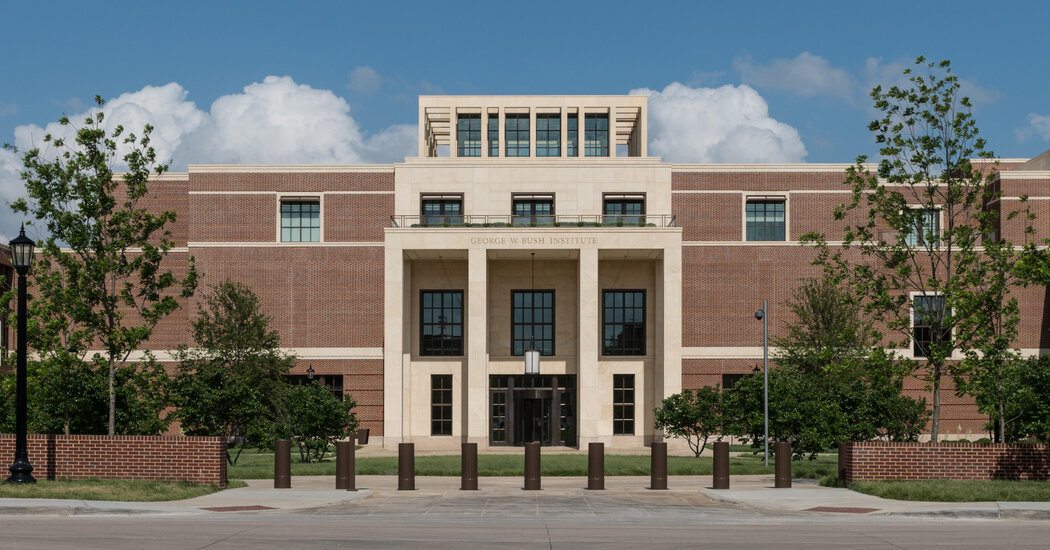A coalition representing nearly every former president from Herbert Hoover to Barack Obama issued a collective call on Thursday to protect the foundat
A coalition representing nearly every former president from Herbert Hoover to Barack Obama issued a collective call on Thursday to protect the foundations of American democracy and maintain civility in the nation’s politics.
The alliance of presidential centers and foundations for U.S. leaders dating back nearly a century, both Democrats and Republicans, is a historic first. Never before has such a broad coalition of legacy institutions from former administrations joined together on a single issue.
The statement is largely anodyne in its prose and is careful not to include specific examples that could seem to refer to a current or a former elected leader. But some of its wording, and its timing, appear to serve as a subtle rebuke of former President Donald J. Trump, who tried to overturn the last presidential election, continues to deny he lost and is now the Republican front-runner for 2024, even as he faces four criminal indictments.
“Each of us has a role to play and responsibilities to uphold,” the statement says. “Our elected officials must lead by example and govern effectively in ways that deliver for the American people. This, in turn, will help to restore trust in public service. The rest of us must engage in civil dialogue; respect democratic institutions and rights; uphold safe, secure and accessible elections; and contribute to local, state or national improvement.”
The Eisenhower Foundation was the only organization in the lineage of presidents from Mr. Hoover to Mr. Obama to not sign the statement, and the organization did not detail its reasoning. No centers, libraries or legacy-type organizations with ties to Mr. Trump signed the statement; the former president does not have a foundation or library.
The idea originated at the George W. Bush Presidential Center earlier this year, according to David J. Kramer, the executive director of the George W. Bush Institute. Leadership at the center drafted the original statement and asked the others to sign on; a few centers offered small edits.
“We just felt that there was a growing need to step back from the day-to-day headlines and, amid all the attention, remind ourselves of who we are, what makes us a great nation and that we’re rooted in an idea of freedom and democracy,” Mr. Kramer said in an interview.
“It’s not about an individual, it’s not about one candidate or campaign,” Mr. Kramer added. “We just wanted to sort of stay at a higher level, and that’s how we were able to get pretty much all the centers united behind us.”
But some of the language in the statement could easily be read as warnings about Mr. Trump. The coalition says that “civility and respect in political discourse” are “essential,” a contrast for a politician known for demeaning nicknames and occasionally violent messaging.
Other ideals expressed in the statement, such as a sense of global responsibility, also seem targeted more toward the Republican base, voters who are more energized by “America First” messaging — a theme pressed by Mr. Trump and repeated by many of his rivals for the Republican nomination.
“Americans have a strong interest in supporting democratic movements and respect for human rights around the world because free societies elsewhere contribute to our own security and prosperity here at home,” the statement reads. “But that interest is undermined when others see our own house in disarray. The world will not wait for us to address our problems, so we must both continue to strive toward a more perfect union and help those abroad looking for U.S. leadership.”
Presidential historians note that the joint statement is unusual.
“You see former presidents typically attending events together, such as, for example, after the passing of former President George H.W. Bush,” said Meena Bose, a presidential historian and an executive dean at Hofstra University. “But to have the centers unite, this institutionalizes the significance of bipartisan commitment.” She added, “It gives both personal and institutional force to the statement.”
Mr. Kramer said the idea had been percolating around the Bush Center for a while. However, when he joined the center in January, momentum grew within the organization to put out a bipartisan and nonpartisan message reaffirming what distinguishes American democracy and has helped it function for more than 245 years, he added.
Valerie Jarrett, a former senior adviser to Mr. Obama and the chief executive of the Obama Foundation, pointed to the caustic political discourse dominating modern campaigns, saying a unified front was essential.
“There is a toxicity to the climate right now that is inconsistent with a strong democracy,” Ms. Jarrett said in an interview. “Open and fair elections, smooth and orderly transition of power, observance of the rule of law: These are foundational pillars of democracy. And so if you had asked me 10 years ago, Would we be really focusing our effort on ensuring that our democracy is strong? A lot of the activities that we do are designed to strengthen it, but we wouldn’t have called it out as an issue that’s under attack.”
Meredith Sleichter, the executive director of the Eisenhower Foundation, said in a statement that the organization “respectfully declined to sign this statement. It would be the first common statement that the presidential centers and foundations have ever issued as a group, but we have had no collective discussion about it, only an invitation to sign.”
The full list of signatories:
-
The Obama Presidential Center
-
George W. Bush Presidential Center
-
Clinton Presidential Center
-
George & Barbara Bush Foundation
-
The Ronald Reagan Presidential Foundation and Institute
-
The Carter Center
-
Gerald R. Ford Presidential Foundation
-
Richard Nixon Foundation
-
LBJ Foundation
-
John F. Kennedy Library Foundation
-
Truman Library Institute
-
Roosevelt Institute
-
The Hoover Presidential Foundation
www.nytimes.com

COMMENTS